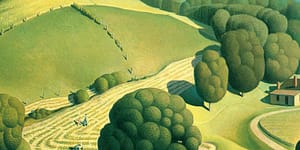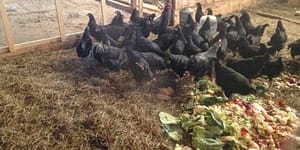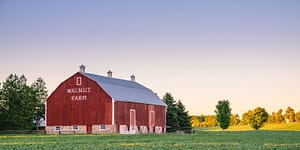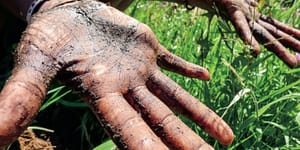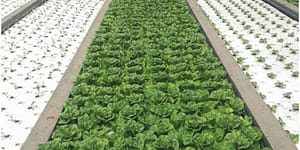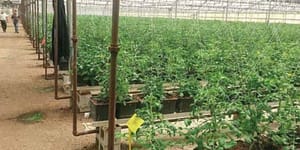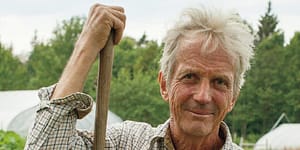Gretchen Kruesi
If you’re a loyal Chelsea Green customer, and haven’t been living in a dam for the last year, the likelihood that you’ve heard about Eager: The Surprising, Secret Life of Beavers and Why They Matter by Ben Goldfarb is high. But if you’re still not sure what all the hype is about, let us enlighten you.…
Read MoreAs the average age of America’s farmers continues to rise, we face serious questions about what farming will look like in the near future, and who will be growing our food. Many younger people are interested in going into agriculture, especially organic farming, but cannot find affordable land, or lack the conceptual framework and practical…
Read MoreEager: The Surprising, Secret Life of Beavers and Why They Matter has won the 2019 PEN America E.O. Wilson Prize for Literary Science Writing! A first book by journalist Ben Goldfarb, Eager has received several accolades since its release last year, including being named an Outside Magazine’s “Best Book of 2018” and a “Notable Work of Nonfiction”…
Read MoreIn order to rescue ourselves from climate catastrophe, we need to radically alter how humans live on Earth. We have to go from spending carbon to banking it. A secret unlocked by the ancients of the Amazon for its ability to transform impoverished tropical soils into terra preta—fertile black earths—points the way. The indigenous custom of…
Read MorePeasants, indigenous agriculturalists, and old-time American farming families farmed first and foremost to feed their own families and those in need in their communities—only secondarily, if at all, for a market. They may have practiced shifting agriculture or were settled permanently in villages; they may have been members of free, “primitive” or “tribal” societies, or…
Read MoreAnything involving farming almost always requires the help of another person, whether you’re feeding the animals or trying to decide if you want to expand the barn. Partnerships not only help with your personal life but the success of your business in the long run as well. Having someone to share the work and ease the…
Read MoreWhen you think of a typical farm, you probably think of going out to feed the animals with a bucket of scraps. This has been one of the most common ways to recycle food for many years and helps reduce your waste footprint. However, composting with the help of animals is another technique used on…
Read MoreThe basis for a good farm isn’t just about finding a piece of land with great soil. No, to truly succeed on the farm you need a well-planned and implemented infrastructure coupled with hard work, dedication, and will-power. As farming practices continue to change, it’s important for the next generation to remember that insight and…
Read MoreFor those who aren’t in the know, it may seem like all farmers are created equal, but that’s simply not the case. In fact, there is such a wide variety of farmers that it’s nearly impossible to put a label on them. But that doesn’t stop organizations from trying. The following is an excerpt from…
Read MoreWe have long been taught that evolution is a process that occurs gradually over millions of years, that change happens slowly without much attention. We’ve come to learn that in reality, evolution happens in fits and starts — very slowly for long periods, then in sudden spurts of rapid change. It may be triggered by…
Read MoreComposting is about more than just flinging your food scraps into a heap in your backyard. It’s about figuring out a way to give your unwanted food a new purpose while also helping the environment. And the best part is, the fundamental building blocks of composting systems are the same regardless of scale. The following…
Read MoreYou probably learned when you were young that plants need soil to get the essential nutrients needed to grow. However, there is another way you can give your plants what they need to flourish. A hydroponic system uses water-based fertilizer as opposed to soil fertilizer. This practice is relatively new to farmers, though it is…
Read MoreIf you love tomatoes, you probably already know just how many varieties of these delicious summertime staples there are. But do you know what makes each one unique? Or how to cultivate them depending on your growing environment? No? Well then sit back and enjoy the read! The following is an excerpt from The Greenhouse…
Read MoreContinuing to grow your crops and harvest them well into the winter months seems like an impossible task. How can they grow when weather conditions are far from warm sunny days? It’s all about adapting to what the season gives you. With the proper techniques and studying the patterns of your area’s climate, growing and…
Read MoreIt is with great sadness that we announce the passing of Matthew Stein, author, environmentalist, MIT-educated engineer, green builder, and beloved member of the Chelsea Green family. Matthew died on December 19, 2018, while out in nature pursuing one of his many passions, rock climbing. In 2000 Matthew published his first book with Chelsea Green,…
Read MoreIn Call of the Reed Warbler, Charles Massy’s stunning observations of interaction between nature, culture, and society is nothing short of eye opening. “By arrogantly having placed ourselves outside the functional operating parameters of Earth’s systems, we now see nature and the Earth as separate from us and so just available for use – while all the…
Read MoreIt’s more than an oxymoron. Massive Small is a framework for urban development that can make cities more sustainable and resilient. But how does it work and does it make sense for the future? The following excerpt is from Making Massive Small Change by Kelvin Campbell. It has been adapted for the web. The Massive Small…
Read MoreWith over fifty years’ experience in agriculture and a penchant for inventing new tools and techniques, Eliot Coleman has solidly established himself as an organic farming pioneer. He has authored several books on his practices, including The Four-Season Harvest, The Winter Harvest Handbook, and his magnum opus, The New Organic Grower, which will celebrate its…
Read MoreChronic and degenerative illnesses are largely new to mankind. In fact, diseases such as cancer, diabetes, fibromyalgia, and multiple sclerosis have been termed modern or man-made diseases because they were relatively rare until three hundred years or so ago. But if these diseases are relatively new, why are so many people plagued with chronic illness?…
Read MoreI’ve worked as an editor for 35 years—my entire adult life. In that time I have seen many changes in the publishing industry: faster computers, better software, and greater production from fewer and fewer actual workers. We could debate just how positive all this increased “efficiency” has been for publishing and for manufacturing as a…
Read MoreFor centuries, humans have had a very strong interest in oil and it’s only getting more intense. Our dependency is reaching a concerning level which Matthieu Auzanneau speaks to in his book Oil, Power, and War. The following article was written by Frank Kaminski and was published on Resilience.org. In Oil, Power, and War, French…
Read MoreAuthors Sy Montgomery and Elizabeth Marshall Thomas discuss Tamed and Untamed: Close Encounters of the Animal Kind—a “most delectable potpourri of tales about a whole host of nonhuman animals”—with writer and friend Marc Bekoff. Q: Why did you write Tamed and Untamed ? Liz: Tamed and Untamed is a collection of columns we wrote for…
Read MoreIn recent years the concept of bioregulatory medicine has become increasingly popular throughout Europe. At its core is the notion that good health is a state of balance and optimal wellbeing, rather than the mere absence of disease and symptoms. To find that perfect state, bioregulatory medicine practitioners must remove whatever agents are blocking the healing process…
Read MoreFor centuries, humans have been migrating in search of better land, opportunities, and quality of life. For some, those migrations were voluntary while others were forced to move due to far more sinister circumstances. The Great Migration is one such case. During the 1900’s through 1970, over six million black people left the rural south…
Read More




